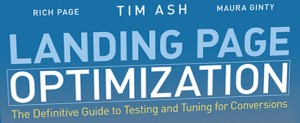

Tim Ash literally wrote the book on Landing Page Optimization. He is the CEO of SiteTuners, the Founder of Conversion Conference and holds a B.S. in Computer Engineering and Cognitive Science, and an M.S. in Computer Science. We wanted to give our audience the chance to get to know him a little bit better in preparation for our webinar, so we asked him a few questions.
(You can watch our on-demand webinar with Tim right now for free.)
What was your journey to becoming a conversion rate optimizer?
It started when I was in college. I took a double major, Computer Engineering and Cognitive Science. Of course, this was pre-Internet, but these ended up being directly applicable to Internet marketing. You could say I studied the “hardware and the wetware” of Internet marketing. Persuading people to act online has the measurable and technical side of tracking online activities as well as the psychological, decision-making side of people. So, although I chose these majors just because they interested me, they ended up being incredibly valuable to my work.
In the early days of the Internet, I ran an agency that was running PPC campaigns for companies. We were quite effective at running campaigns and pushing good, relevant traffic to our clients' sites, but this traffic was not converting because their sites were poorly built. We realized that it was in our best interest and our clients' best interests to optimize their landing pages. So we redesigned their sites and saw huge success. Eventually, we dropped the PPC campaigns and solely focused on conversion rate optimization.

To be good at conversion rate optimization, what disciplines are most important?
There are so many pieces and disciplines that go into CRO. You need experts in usability, visual design, statistics, copywriting, psychology and neuromarketing. Beyond specific roles it’s important to be a good business analyst, and make sure you are asking for the right conversion actions in the first place.
As a Conversion Rate Optimizer, what’s your main focus?
We go into a business and operate as "the voice of their visitors." We advocate for them, because so often they've been lost in the shuffle. We try to correct that. You can't have an "inside out" view of the world (projecting what your company is to the outside world). Instead you need to focus on your visitors. What is their knowledge base, expectations, and framework; and how can you line your business goals up with their existing needs? Answering those questions is a critical part of what we do.
The main focus of what we do is staunchly advocate for the needs of the visitor, not the structure of the company.
What is the biggest obstacle for companies trying to listen to their customers? What's stopping everybody from doing this?
The first obstacle is that many businesses don’t really have empathy for their users. You’ve heard of the Golden Rule, “Do unto others what you would have them do to you.” Tony Allessandra, a sales trainer, introduced me to the Platinum Rule, "Treat others as they want to be treated." At the heart of this approach is empathy. It’s critical to realize that not everyone is the same as you. And since it’s natural for us to assume that people are like us, we substitute our own biases for our target audience. It's very rare that you're designing a site and are also the target audience for that site.

Second, we're experts at our own business and we really care about it. We forget that the people visiting our site are lazy, busy, and don't care. Our experience covers a lot of problems for us on our websites that are actually huge roadblocks for first time visitor. It's hard to get into that first timer mindset when you're an expert at your own site.
What's your opinion of personas?
For conversion rate optimization, they’re total B.S. They're not for improving conversion rates, but for designing ad campaigns. They work just fine in the advertising world, but if you're talking about CRO, then you need to come up with scenarios that are based on more durable people's roles and the task they're trying to complete on your site. It's important to keep them more functional and grounded in what people want to do on your site. Our relationship to the website, the role we're playing, and what stage in the decision-making process we are in, is more important than our personality, age or employment.
It's 2013, when you're browsing the internet, what surprises you the most about what people still aren't getting right?
The most common issues are the total clutter on the page, too much information, too many graphics, visual distractions, animations, sliders, and general overload. The inability for people to be able to edit down their messes. Closely related is having too much text on the page. It's fine to have more details on a “more details” page, but partly because of clumsy SEO and the inability to edit, there is just way too much text on many landing pages.

I wrote a whole chapter in my book about this, the "Seven Deadly Sins of Landing Page Design."
Each department is vying to have their content on the home page. How do you go into companies and convince the decision makers that less is more?
You primarily do that by landing page testing. You let them have a "horse in the race." You think people like a landing page with a lot of information, we think a stripped down experience might work better. Then you test to see what visitors think. This makes things a lot easier. When the new version converts a lot better and brings in more money, it makes it quite a bit easier to convince the CEOs to change their minds.
How do you recommend budgeting for testing?
These things should be basically self-funding. You put up some initial money at first and then it pays for itself many times over. After that you should have the psychological momentum to do more testing.
You hear all sorts of landing page best practices that are passed off as "gospel," such as “make your buttons orange.” What do you think are some of the biggest misconceptions people have about CRO?
A big problem is this "herd mentality" that many people have: "I read it on a blog post, so therefore I should put it on my site." Every audience is different, and you should be testing this stuff. It depends on the context. Common advice is that "red buttons are bad." But that didn't apply to our customers Verizon Wireless, Red Envelope and Canon, because those are their brand colors. There are exceptions to everything and you should be testing it.
What should you test?
Some people say you should test everything at every point, but often those tests end up being trivial and stupid, "green button, orange button" kind of things. A lot of times what is wrong is the overall user experience, not a particular page on the site.

We often advocate for doing site-wide conversion facelifts or redesigns to get rid of all of the obvious problems first. This helps you get rid of your worst practices all in one shot. Stopping the bleeding is going to give you a major lift right away. Testing inside of a pile of garbage is not a good solution. You first need to tackle the fact that it's surrounded by a bunch of things that aren't working. After that you can refine further by testing.
Where do you get ideas on what to test?
A number of qualitative and quantitative sources, everything from your analytics to usability testing, to customer service complaints, to site search. I have a whole chapter in my book about that.
Want to learn more about Landing Page Optimization? Watch our On-Demand Webinar with Tim.
Insights that drive innovation
Get our best human insight resources delivered right to your inbox every month. As a bonus, we'll send you our latest industry report: When business is human, insights drive innovation.






